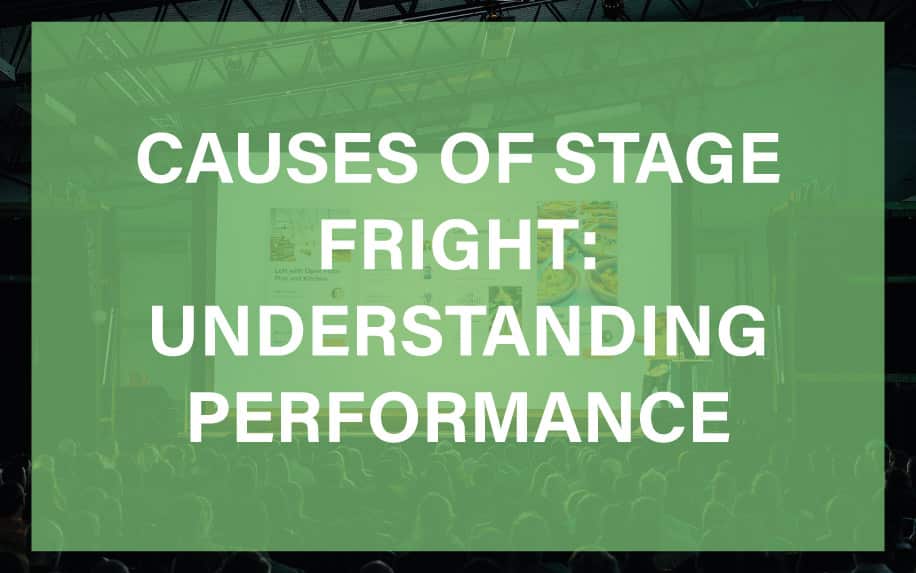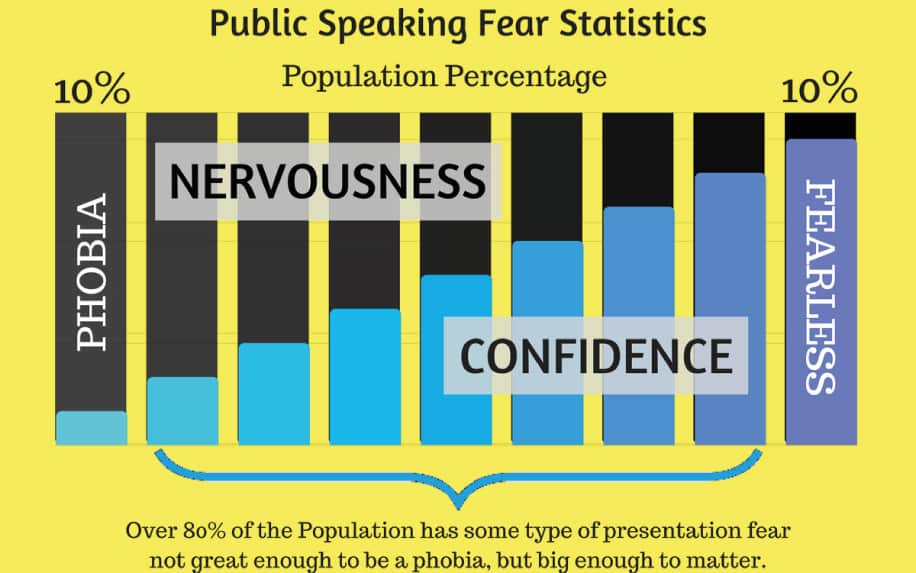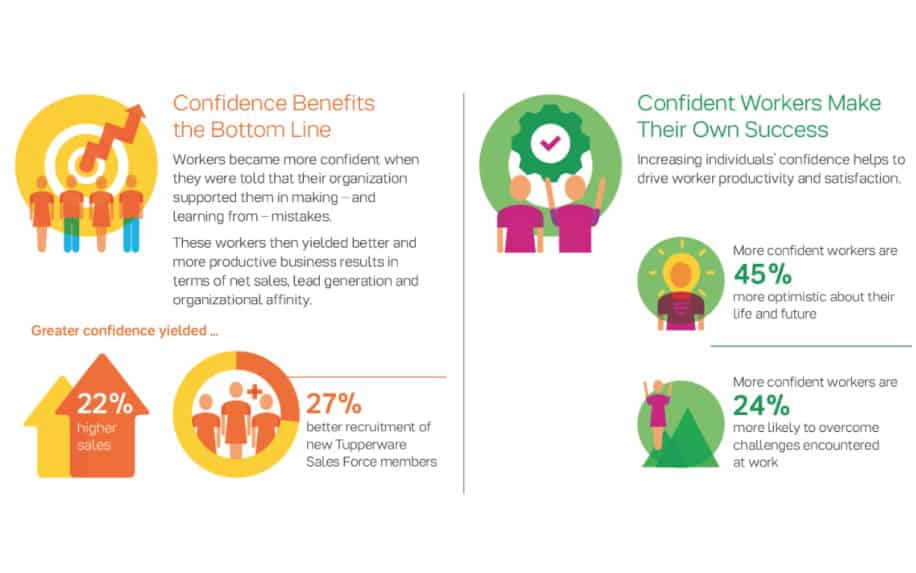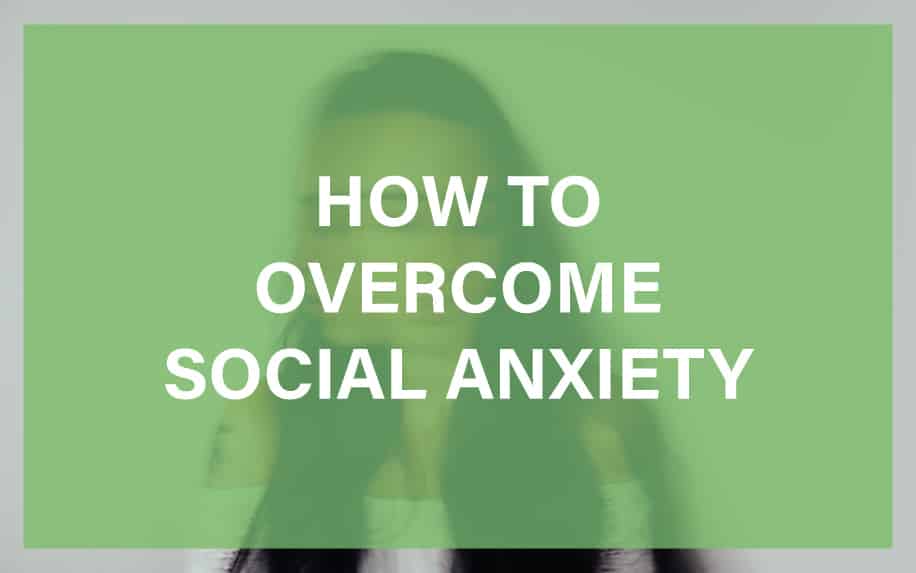Stage fright, or performance anxiety, is a common experience for many people, and everyone at some point in their life will have felt it. It might occur if you have to sing on stage, give a presentation, talk in front of a crowd, or any other scenario that requires you to become the main focus.
The exact causes of stage fright differ from person to person, but there are a lot of techniques you can use for overcoming this type of anxiety. In this article, we’ll explore some tools you can use to minimise stage fright and present your best self.
But before we identify how to overcome stage fright, it is important that we understand it.
Table of Contents
What Is Stage Fright?
Stage fright is a common type of anxiety disorder, it is not uncommon or abnormal and many people experience it in everyday life.
Stage fright, also known as performance anxiety, is a type of anxiety that occurs before or during a performance in front of an audience. It’s not limited to only performing on a literal stage but can occur in any situation where a person is the centre of attention, such as giving a presentation, public speaking, playing a sport, or even playing music in a casual setting.


When Do People Get Stage Fright?
Stage fright can affect anyone, but it is predominately brought upon when there is an upcoming event that requires you to become the centre of attention. This might be something as simple as speaking to a group of people, a job interview, or giving a presentation. It can also affect the most seasoned of performers, like actors, musicians or politicians.
Stage Fright Causes
Stage fright, also known as performance anxiety, can be caused by various factors, your stage fright might be caused by one or several of these factors, including;
Fear of Judgment or Negative Evaluation
This is perhaps the most common cause of stage fright. People often fear making mistakes, looking foolish, or not meeting expectations in front of others. This fear can be particularly strong when performing in front of large audiences.
Lack of Preparation or Experience
If you’re not adequately prepared or inexperienced in public speaking or performing in front of a crown, you may experience stage fright. With more practice and exposure, you can gain confidence and reduce anxiety – practice makes perfect after all.
Past Negative Experiences
If you’ve had a negative experience while performing in the past, such as forgetting your lines or freezing up, you may develop a fear of it happening again. This can cause anxiety whenever you have to perform as your may fear the same thing will happen again.
High Stakes
If a lot is riding on your performance, such as a career opportunity or a significant competition, you may experience more anxiety. Stage fright can particularly peak when we really want to achieve something that’s ridding on this performance.
Personality Traits
People with certain personality traits, such as perfectionism or a tendency towards anxiety, may be more likely to experience stage fright, but keep in mind, anyone can experience this type of anxiety, regardless of their personality traits.
Mental Health Issues
Conditions like anxiety disorders, panic disorder, social phobia, or depression can contribute to or exacerbate stage fright. Sometimes it can seem a little too overwhelming to perform in front of others and that’s ok, your mental health is the top priority, sometimes taking a step back is the better option.
It’s worth noting that stage fright isn’t limited to performers or public speakers. Anyone who has to present themselves in front of others, from athletes to students, can experience stage fright. Furthermore, stage fright is not a sign of incompetence, many skilled and successful performers experience stage fright, and it’s often viewed as a normal part of the performing experience
What Happens When You Experience Stage Fright?
Not everyone experiences stage fright in the same way, but there are a number of common symptoms that describe the experience. In addition to mental stress, stage fright can also manifest physical symptoms. These include:
- Panic and fear
- Cold, sweaty hands
- Numb or tingling hands/feet
- Rapid heartbeats
- Irregular or strong heartbeats
- Nausea or upset stomach
- Shortness of breath
- Dry mouth
- Trembling, stuttering, or shaky voice
- Dizziness
- Fainting
- Increased blood pressure
- Excessive sweating and/or blushing
- Vision changes
The level and intensity of these symptoms will vary from person to person and you might not experience all of them.
Even seasoned performers experience some degree of stage fright but there are many strategies to manage it, including various forms of psychological preparation, relaxation techniques, practice and rehearsal, and sometimes medication for severe cases.
In some cases, stage fright can actually improve performance by providing a rush of adrenaline that can make a performer more alert and energetic. The key is learning how to manage the symptoms and channel the energy productively.
Stage Fright Phobia
It’s important to remember that some people have stage fright as a major phobia. This is when the symptoms are extremely exaggerated and they prevent you from living a full-filled life. if you think you might have stage fright in this context, speak to your GP or a health professional.
Stage Fright Phobia Name
The phobia associated with stage fright or fear of public speaking is known as ‘Glossophobia’. The term comes from the Greek words “glossa,” meaning tongue, and “phobos,” meaning fear or dread. People with glossophobia often experience nervousness, stress, discomfort, and extreme anxiety when required to speak in public. It’s one of the most common phobias.
How to Overcome Stage Fright?
The easy answer is to just avoid being the centre of attention, but even though it may give you a sense of immediate relief, it’s still not a good option as it reinforces the anxiety and doesn’t actually help you overcome it all.
Overcoming stage fright can be a personal journey as everyone experiences anxiety differently. However, there are some generally effective strategies to help calm you and keep you grounded. Check them out below.
Preparation and Practice
The more familiar you are with your material, the more confident you’ll feel. Rehearse as much as possible in conditions similar to those of the actual performance and if possible, practice in front of others. If you practice your next presentation well, chances are it’ll just flow effortlessly which will help boost your confidence and leave you looking forward to your next presentation.
Observe
Sometimes you can find yourself confused about how you should present a certain topic. This is when it is a good idea to see how others did it to get some inspiration. Thanks to the internet there are millions of speeches available to give you ideas, start by searching for someone who has successful done what you’re about to.
Visualise Success
Before you perform, take a moment to visualise the whole process going well. This can help you approach the performance with a more positive mindset and help you remember why you’re putting yourself out there in the first place.
Breathing Exercises
Deep, controlled breathing can help slow your heart rate and help calm your nerves. It can also help you focus on something other than your anxiety. Try breathing in for 10 seconds and breathing out for 10 seconds, do this 5-10 times.
Warm Up
Just like athletes, performers benefit from a warm-up. Do some light physical activity or stretches to get your blood flowing and shake out any tension in your body. Vocal warm-ups can also help if your presentation involves speaking or singing.
Quitting Negative Thoughts
We’re all guilty of overthinking situations, but it’s one of the worst ways to become anxious about what might go wrong. This in itself is often the cause of stage fright, which results in you not being able to give your best performance or presentation. So stop if you catch yourself thinking negative thoughts, and keep in mind what can go well.
Positive Self-talk
What you tell yourself matters, especially when you’re experiencing feelings of anxiety. Encourage yourself with positive affirmations and self-talk. Instead of thinking “I’m so nervous,” try to think “I’m prepared and people want to hear what I have to say.”
Shift Your Focus
Instead of worrying about your performance, you should instead focus on the importance of conveying a message to the audience. This not only helps you overcome stage fright, but it also helps you focus on the content you are delivering, leaving less space for you to think about your performance.
Familiarise yourself with the venue
If possible, spend some time in the place where you’ll be performing. Get a feel for the space, and if you can do a practice run. We are instinctively aware of new spaces, so this can help make the environment you’ll be performing in seem less intimidating and familiar.
Connect With Your audience
Remember, most audiences are empathetic and they want to see you succeed, they are also interested in what you have to do/say. Try making connections with them through casual eye contact and engagement, this will help you feel less isolated on stage.
Turn Nervous Energy Into Performance Energy
Stage fright is still a form of energy, and we can feel it more intensively when we really want to succeed. Many successful performers learn how to take their nervous energy and channel it into their performance, enhancing their delivery rather than detracting from it. So try not to think of it as such a negative thing.
Seek Professional Help
Some people can experience chronic stage fright meaning they are highly anxious about speaking in public, even to small groups, such as a meeting. However, even chronic stage fright can be managed through different therapies, like CBD. If you think you are experiencing chronic stage fright, you should seek help from professional help from a coach, therapist or doctor.
Avoid Caffeine
Caffeine is historically known to cause nervousness and boost anxiety and frequent trips to the bathroom. So you should aim to avoid it on your big day. Instead, aim for a warm drink which will help you relax or soothe your vocal cords.
Remember It’s Normal
Remember, feeling some degree of stage fright is perfectly normal, and even the most seasoned performers can experience it. The goal should not be to eliminate stage fright entirely but to manage it effectively so it doesn’t hinder your performance.
Stage Fright Hypnosis
Hypnosis is a therapeutic technique that can be used to help individuals overcome various fears and phobias, including stage fright. The process involves inducing a state of deep relaxation and heightened focus, often referred to as a trance state. In this state, the individual is more open to suggestions and can more effectively change their thought patterns and behaviors.
Here’s how hypnosis might be used to help someone overcome stage fright:
- Relaxation: The first step in hypnosis is usually to help the individual achieve a state of deep relaxation. This can help reduce immediate feelings of anxiety and make the individual more receptive to the hypnotherapist’s suggestions.
- Suggestion: Once the individual is in a relaxed state, the hypnotherapist will use various techniques to suggest new ways of thinking and behaving. For example, they might suggest that the individual will feel calm and confident the next time they are on stage.
- Visualisation: The hypnotherapist might also guide the individual to visualize themselves successfully performing on stage without fear. This can help the individual build confidence and reduce anxiety.
- Post-Hypnotic Suggestions: These are instructions given during the hypnotic state that continue to have an effect after the session has ended. For example, the hypnotherapist might suggest that every time the individual steps onto a stage, they will feel a wave of calm and confidence.
- Repetition: Hypnosis is usually most effective when the sessions are repeated over time. This allows the new thought patterns and behaviors to become more deeply ingrained.
It’s important to note that the effectiveness of hypnosis can vary greatly from person to person. Some people are more susceptible to hypnosis than others, and not everyone will experience the same benefits. As with any therapeutic technique, it’s important to work with a qualified professional and to discuss any concerns or questions you might have.
Overcoming Stage Fright Quotes
Check out these quotes to inspire you about overcoming stage fright and remember it’s a COMPLETELY NORMAL feeling.
- “Fear is a powerful beast. But we can learn to ride it.” – Justine Musk
- “Do the thing you fear, and the death of fear is certain.” – Ralph Waldo Emerson
- “Stage fright is very common and could be overcomed by love and passion towards your job.” – Katori Hall
- “Having stage fright is like having butterflies in your stomach. The trick is to get them to fly in formation.” – Unknown
- “Feel the fear and do it anyway.” – Susan Jeffers
- “I don’t have stage fright, I have people fright.” – Stevie Nicks
- “Everything you’ve ever wanted is on the other side of fear.” – George Addair
- “Stage fright is the shadow of your creativity. So, don’t be scared of the dark, it’s making you shine bright.” – Amit Kalantri
- “The amateur believes he must first overcome his fear; then he can do his work. The professional knows that fear can never be overcome. He knows there is no such thing as a fearless warrior or a dread-free artist.” – Steven Pressfield, The War of Art.
- “There is only one way to get rid of stage fright – it’s called rehearsal.” – Unknown
- “Stage fright is a signal that you care about what you’re doing. Don’t feel that you’re doing something wrong by being nervous. It’s everything.” – Barbra Streisand
- “I feel it’s all wrong to be nervous,” said Maria. “I feel it’s lack of confidence. One ought to go right ahead, never minding.” “Some people do,” he said, “but they’re the duds. They are the ones that win prizes at school, and you never hear of them again. Go on. Be nervous. Be ill. Be sick down the lavatory pan. It’s part of your life from now on. You’ve got to go through with it. Nothing’s worth while if you don’t fight for it first, if you haven’t a pain in your belly beforehand.” – Daphne du Maurier
- “I get stage fright and gremlins in my head saying: ‘You’re going to forget your lines’.” – Unknown
- “The Alexander Technique has helped me to undo knots, unblock energy and deal with almost paralysing stage fright.” – Unknown
- “I have stage fright every single concert I’ve ever done. I have at least four or five minutes of it. It’s absolute living hell.” – Unknown
- “In my opinion, the only way to conquer stage fright is to get up on stage and play. Every time you play another show, it gets better and better.” – Unknown
- “The whole concept of stage fright is fascinating. Actors get stage fright, but they wouldn’t be on the stage in the first place if they just succumbed to it. There’s this love/hate relationship with the spotlight.” – Unknown
- “You get used to it, you look forward to the adrenaline of the stage fright before you go out.” – Unknown
- “Throughout my career, nervousness and stage-fright have never left me before playing. And each of the thousands of concerts I have played at, I feel as bad as I did the very first time.” – Unknown
- “Stage fright, is a divine ailment, a sacred madness…it is insufficient by itself but a necessary condition for success.” – Unknown
Remember, it’s entirely normal to experience stage fright or performance anxiety. Even some of the most seasoned performers experience it. The key is to accept it and find ways to use that energy to fuel your performance rather than hinder it.
Stage Fright Poem
Check out some of these poems about stage fright. They will reassure you about this very common feeling and give you hope in that it can be overcome.
Stage Fright – Julia A. Keirns
Sweaty palms
And a nervous stomach
Getting up in front of a crowd.
Everyone staring
Waiting and listening
For me to speak out loud.
Butterfly sensation
My voice begins to crack
And the words begin to flow.
I speak and talk
The truth comes out
I stand firm in the glow.
Confidence appears
Fright and worry die
Others judge the sound.
Smiles and laughter
Thoughts achieved
Clapping hands abound.
Stage Fright – Brenda Arledge
A feeling of queasiness
in the pit of her stomach,
skin flustered, burning hot,
taking a sip of water,
gasping one deep breath.
She fearfully staggers upon the stage
standing in front of the mic,
but hears a quiver shaking in her voice
as she begins to utter words.
She wants to run and hide
but it feels as if her feet
are glued to the floor,
when she remembers granny saying
“to picture them in underwear.”
She believes this is waste of time
but has nothing left to lose,
when suddenly the words come tumbling out,
and the corners of her lips turn up,
for ole granny
knew a thing or two.
How to Boost Your Confidence?
Another great step for learning how to overcome stage fright is to boost your confidence. If you improve your mental image of yourself, you’ll have a much easier time presenting to a crowd without worrying about how you look, speak, or act in front of others.
The best way to boost your confidence is to think positively about yourself. Try to eliminate negative thoughts and replace them with positive thoughts that will emphasise your strengths, i.e.) “I know the subject that I’m going to be talking about well, and I am very capable of delivering a good speech”.
Have a sit down with yourself and list your positive traits. These traits are what you should be focusing on instead of criticizing yourself. This might seem like a lot of work, but it’s an investment in yourself. Below, we have listed just the right books to help you through your journey.

The Power of Positive Thinking
This book was written by Dr. Peale in 1952. It is considered to be the basis on which self-improvement was established. This book aims to prove to you that positive thinking goes a long way in terms of your progression as a person.
It aims to prove to you the importance of positive thinking through the use of real-life examples of success. This is a refreshing alternative to other books that simply state what needs to be done with little convincing. Many have praised the book for its effectiveness in helping them believe in themselves which has caused the book to sell over 5 million copies throughout the years.
The Six Pillars of Self-Esteem
Dr. Nathaniel Branden wrote this book with the intention of giving readers a scientifically accurate way to improve their self-esteem. As a psychologist, he has written a very methodical and efficient process to help you achieve your vision. This book is divided into six sections that the author believes are the building blocks to healthy self-esteem.
Here is a brief explanation of each section as an overview.
Living Consciously
Basically, this section encourages the reader to become aware of their current life. Before anything can be fixed, you first need to identify the problem for low confidence.
Once you become aware of your everyday life you’ll start noticing some flaws that you’ll naturally tend to avoid. Being conscious not only helps you identify your attitudes, but it also helps you improve them which goes a long way when you’re trying to learn how to overcome stage fright.
Self-acceptance
This next section is all about accepting yourself and your thought process. Once you accept yourself for who you are, your mind will spend less time criticizing yourself and more time on self-improvement. Overall, this allows you to become a much more enhanced version of yourself which will surely boost your self-esteem and make it much easier to talk in front of a crowd.
Self-responsibility
This section is all about taking control over your life. It teaches you that excuses will get you nowhere in life and that you must stop viewing yourself as a victim and instead take initiative. You may have to face some hard truths, but ultimately it is worth it.
Self-assertiveness
Assertiveness is often a term used to describe taking initiative. It implies confidence and thus it fits quite well in this plan. The reader is encouraged to fully accept themselves for who they are in order to begin improving themselves. This section complements the previous pillars and helps put you on the first step towards the more confident you.
Living Purposefully
Being successful is all about setting goals and achieving them. Even when it comes to self-improvement, it is extremely important that you set realistic goals and achieve them. These goals will ensure that you are improving as a person while also boosting your confidence through the satisfaction of achieving a vision.
Personal Integrity
This last pillar is what separates confidence from deceit. People might be tempted to lie to others in order to impress them but it is important to understand that these lies do nothing but set them up for failure. For a person to be confident in themselves, it is important that they have a sense of personal integrity that they can rely on. This will help eliminate over-thinking about how others view us.
Use the Power Pose
The “power pose” is a concept that originated from a 2010 study by social psychologists Amy Cuddy, Dana Carney, and Andy Yap. The idea is that adopting “high power” poses, which are open and expansive, can influence your feelings, behaviors, and hormone levels.
The researchers suggested that standing or sitting in a way that opens up the body and takes up space, can cause changes in hormones, including an increase in testosterone (a hormone related to dominance and power) and a decrease in cortisol (a stress hormone). This, in turn, could increase feelings of power and tolerance for risk, and decrease feelings of stress.
One of the most famous power poses is the “Superman” or “Wonder Woman” pose, where you stand tall with your hands on your hips, your chin up, and your feet spread apart.
How to Get Better at Presenting?
One of the best things you can do on your journey to learn how to overcome stage fright is to get better at presenting. This will help give you the upper edge because you can rely on your skills to deliver a successful presentation and engage with the audience.
Preparing Your Presentation
Before you start creating the slides for your presentation, it is generally a good idea to create an overall vision of the message you are trying to convey, this will help ensure that your message reaches the audience effectively. Here are a few things to consider when you’re designing your presentation.
The Audience
You need to consider how familiar the audience is with the topic. This will allow you to choose the correct balance between informative and entertaining. After all, you do not want to bore the audience which is why you need to properly analyse the expected audience beforehand in order to ensure that your message gets delivered in the most effective way.
The Objectives
You need to keep the purpose of your presentation in mind when you are creating it.
This means that you need to know why you are presenting this topic to the audience. There are many types of presentations that you’ll have to do in your professional life but they usually have similar purposes, you are either informing the audience about a decision that was made or you are informing the audience about a current situation in order to allow them to make an informed decision.
Practicing Your Presentation
A great way to help you overcome stage fright is to rigorously practice until you perfect your speech. This will be a huge relief for you when you eventually have to present in front of an audience. Start by memorising your speech so you don’t need to look at a paper or screen during your performance.
It is okay to have notes, however, they should simply act as reminders for your content or you risk sounding monotonous like you’re just reading aloud.
Carrying Out the Presentation
On your big day, make sure you eat light and avoid caffeine as it is notorious for causing anxiety. Make sure you are completely relaxed, and try to do some meditation or yoga prior. Try to turn any nerves into enthusiasm that’ll capture the audience’s attention.
Stage Fright in Public Speaking
There are many experts in the field of public speaking, which is particulary useful if your stage fright is primarliy centred around speaking in public. Here are a few notable ones:
Dale Carnegie
Known for his course “Dale Carnegie Course in Effective Speaking and Human Relations,” Carnegie’s teachings have been influential in helping people improve their communication and public speaking skills. His book “How to Win Friends and Influence People” is a classic in the field.
Tony Robbins
A well-known motivational speaker, Robbins has spoken at numerous conferences and has a number of published works. He is known for his energetic and engaging speaking style.
Les Brown
As a former radio DJ and member of the Ohio House of Representatives, Les Brown has used his public speaking skills in various arenas. He is now a prominent motivational speaker and author.
Carmine Gallo
Gallo is a popular keynote speaker and author who has written several books on communication and public speaking, including “Talk Like TED: The 9 Public-Speaking Secrets of the World’s Top Minds.”
Patricia Fripp
Fripp is an executive speech coach and sales presentation skills trainer. She was the first woman to become president of the National Speakers Association.
Toastmasters International
This is not a single person but an organisation dedicated to helping people improve their public speaking and leadership skills. They offer local clubs where members can practice speaking in front of others and receive feedback.
Causes of Stage Fright: Key Takeaways
Presenting to an audience can often be incredibly nerve-wracking, but it is important for you to realise that we are often too hard on ourselves and our criticisms are usually unfair. Stage fright is a completely normal thing to experience, and like anything else, you can learn to minimise the effects and present your best self.
For more articles regarding self-improvement, check out our article on The Art of Communication.


